This is part of a series of posts about recent developments in English language science fiction publishing in the US and UK that have caught my eye.
For an aspect of life that, let’s face it, is inescapable, growing old still throws up its fair share of surprises and shocks. On Monday nights, I write in the local village pub. In the dark days before I wrote full-time, starting the first evening of the working week on a high was a key part of my psychological strategy for surviving the next four days. It’s a habit I’ve kept because the beer is really very good, and… I love writing! I’ve been enjoying Monday writing nights since 2001, and in recent years I get a shock every once in a while when I meet new bar staff who hadn’t even been born when I moved to the village in 1997.
I was surprised to discover when I attended the excellent 20Books London conference back in February, that I was old all over again, but in a different way. [As an aside, I thoroughly recommend professional authors attend 20BooksTo50K conferences.]

I was made redundant from my old job the first day back after New Year 2011. By March 2011, I’d set up as a sole trader and re-published some short stories through Amazon KDP and Smashwords. I’d sold them previously to various short fiction publication since 2002. Back in 2011, if you hung around Kindleboards, Amazon’s KDP forums, and various other self-publishing forums and Facebook groups, you’d probably know who I was because I was pretty active online.
I wasn’t prepared for these memories of dusty old 2011 being ancient prehistory for so many of the wonderful writers I met at London. Not only was it clear that many authors had started their professional careers after me (at least, the self-published portion), but I was asked on more than one occasion: “what was it like back in the early days?” (The answer, by the way, is interesting, but a topic for another time.)
When I got home, I looked through the bios of the bestselling science fiction authors on Amazon.com (for which Amazon provides a convenient top 100 authors list) and stalked their websites, gauging when the top authors of today began their careers. The answer is clear: surprisingly recently.
Now we move to the part of this article where I commit extreme conjecture. As I’ve said several times in blogs this year, it’s clear the number of authors earning a living income from English language science fiction book sales has soared to an unprecedented level, but no one knows for sure what that number actually is (my estimate is around 250, which still isn’t very many). Without a solid divisor, I won’t estimate a percentage of those authors who began their publishing career since 2011, but it is clearly very high indeed. I would go so far as to say that most authors who write English language science fiction for a living today had never written a science fiction story when I went full time at the start of 2011, let alone had one published.
Probably.
It’s difficult to be certain about these things, but it seems beyond doubt that an enormous influx of fresh blood has entered professional SF publishing in only a handful of years.

For the image above, I grabbed today’s list of the top-10 bestselling science fiction authors. Admittedly, I grabbed the lower section because I recognized them as all being predominantly self-published authors. In fact, I needn’t have done so to indicate newness. In terms of debut novel, the full SF top-10 is: 2018, 1969, 2012, 2011, 2016, 2015, 2011, 2016, 2010. Margaret Atwood stands out as the veteran in that list.
Across the hall in the top-10 bestselling fantasy authors, we have 2012, 1997, 1991, 1977, 2005, 1937, 2012, 2017, 2011, 2015, J.R.R. Tolkien perhaps a lesson in why sometimes medians are more telling than means! Still lots of new faces, but more veterans than with the SF. Also, with 60% female authors rather than 20% for the SF list.
My background is more conventional (or was until a few years ago when it flipped from conventional to old-fashioned). I came up through creative writing courses, critique workshops, and submitting short stories to magazines. Although I gained enormously from this experience, I also learned a great deal of limitations: all those things I was informed I should not do, because… reasons.
- You shouldn’t write these stories, because they’ve been done before… (perhaps back in the 50s).
- You shouldn’t write this way because that way is better.
- You must never write this popular trope because it has to be subverted.
- Don’t write this, because editors want that.
- And what will appear to today’s writers to be the most asinine advice in the history of publishing: never write to please an audience!**
I think my personal revelation about the freshness of contemporary SF writers helps to explain why I enjoy the latest crop of SF novels so much more than the books of a decade or two ago. Many of today’s novels are written by authors who were never told what they shouldn’t write, so they simply wrote the stories they wanted to tell, and in the way they wanted to tell them. Some of those writers go on to connect with an audience that thinks they write great stories with great skill. Of these, some are rewarded with successful writing careers.
And some aren’t.
There are no guarantees in SelfPub and NewPub science fiction; no arbiters to say that this author deserves to succeed over that author (other than readers themselves). It’s not set up to be fair.
Well, perhaps it is up to a point. Being a good writer is no guarantor of commercial success, but in today’s incredibly competitive publishing scene, commercial success is only possible for writers whose stories are judged by their audience to be of high quality.
I think that’s part of the reason why the science fiction audience has seen such explosive growth. These whippersnapper new authors never learned the old lessons about what not to write.
And as a consequence, for a legion of new readers, science fiction literature has recently become a lot more relevant to them.
Where will the publishing youngsters lead us in the coming years? We’ve already moved at internet pace from the frontier era of SF self-publishing – rather like living an episode of Deadwood – to the backbone of slick professionalism we see today.
What’s our destination? Who can tell? Although we do seem to be fanning out toward multiple destinations, and with such rapid growth in the audience, it’s difficult to tell the degree to which newer authors are competing rather than co-existing with older ones. But I do know it’s a journey I’m excited to be a part of as both a writer and a reader.
Three cheers for the youngsters!
** Never write to please an audience.
Yes, astonishing as it will seem to many of today’s professional authors, I did receive variations on that well-intended advice on more than one occasion. It was given for a number of reasons, and in the days before Amazon KDP some were entirely valid. I remember an experienced agent and former acquisitions editor discussing this at a convention. He explained that he couldn’t sell manuscripts to publishers if they followed popular trends, and therefore he wouldn’t accept them as an agent. Essentially, the argument was that trad publishers only had a limited number of publishing slots, and for any significant audience they could define, they would have already filled them before you could get your book published. Terry Pratchett was extremely popular, he explained, which is why every major publisher had already jumped on the Pratchett-market bandwagon, and consequently why you shouldn’t try to write for that audience.
OK, that’s strictly the justification for the advice of don’t follow the market, but it was part of a whole battery of advice suggesting writers should avoid having the book-buying public in mind when they wrote their stories, which is pretty much the exact opposite of the philosophy behind the 20Booksto50k movement.
Tim C. Taylor is a British author of popular science fiction who quit the day job in 2011. For a free starter library of exclusive stories, which make great jumping off points into his multiple book series, join the Legionaries by following THIS LINK.
Join a mercenary company. See the galaxy. Kill the bad guys. Get paid. A
lot.
Join a mercenary company and give the galactic bad guys what they deserve in his latest novel, The Midnight Sun, published by Seventh Seal Press on April 27th, 2018.
If pulp adventures facing cosmic gods and Cthulhu cultists is your thing, back the Kickstarter for a Lovecraftian pulp anthology in which Tim has a story, set in Birmingham, England in 2015. If you’re American, your likeness could be drawn as a cosmic demon or cultist (this only works with Americans, for reasons of great cosmic complexity involving the terrifying cult known only by the eldritch name: US Postal Service). Legal notice: the campaign organizers do not guarantee backers against loss of sanity when the Old Ones awake from their slumber (though backing this anthology can’t hurt). The campaign closes May 25th.





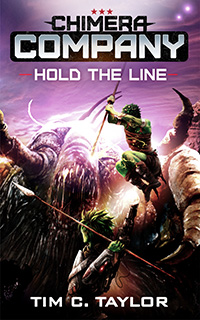
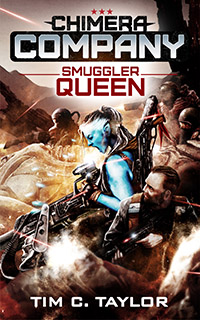

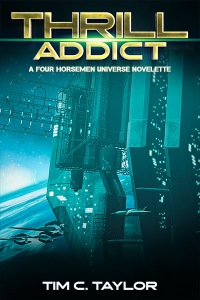
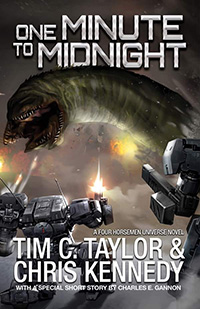
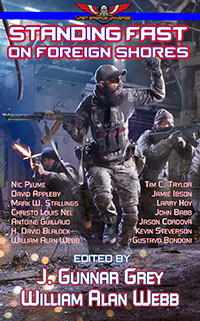
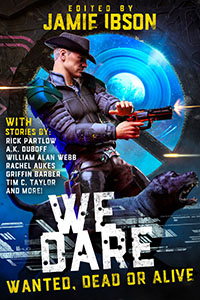


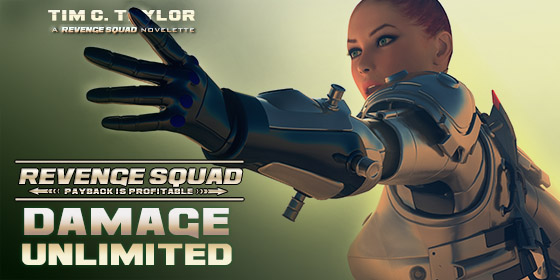

Another winner!
Thanks, Jane. It is indeed such great fun to write, and I’m glad to hear you’re getting a kick out of it. When I was a kid, I used to spend many hours designing role playing scenarios. Then it was designing and building software professionally, and songs not quite so professionally. Now I dream up worlds and turn them into stories. It’s a wonderful way to continue satisfying the creative urge 🙂
Well I’m not getting paid a lot, but writing science fiction is very satisfying. I am a botanist by training so world building is at the top of my “Why write scifi” list. Also, stories can go anywhere … in my last book, my hero gets taken into a hollow tree by some critters and gets stuck! Fun to write your way out. Good post!